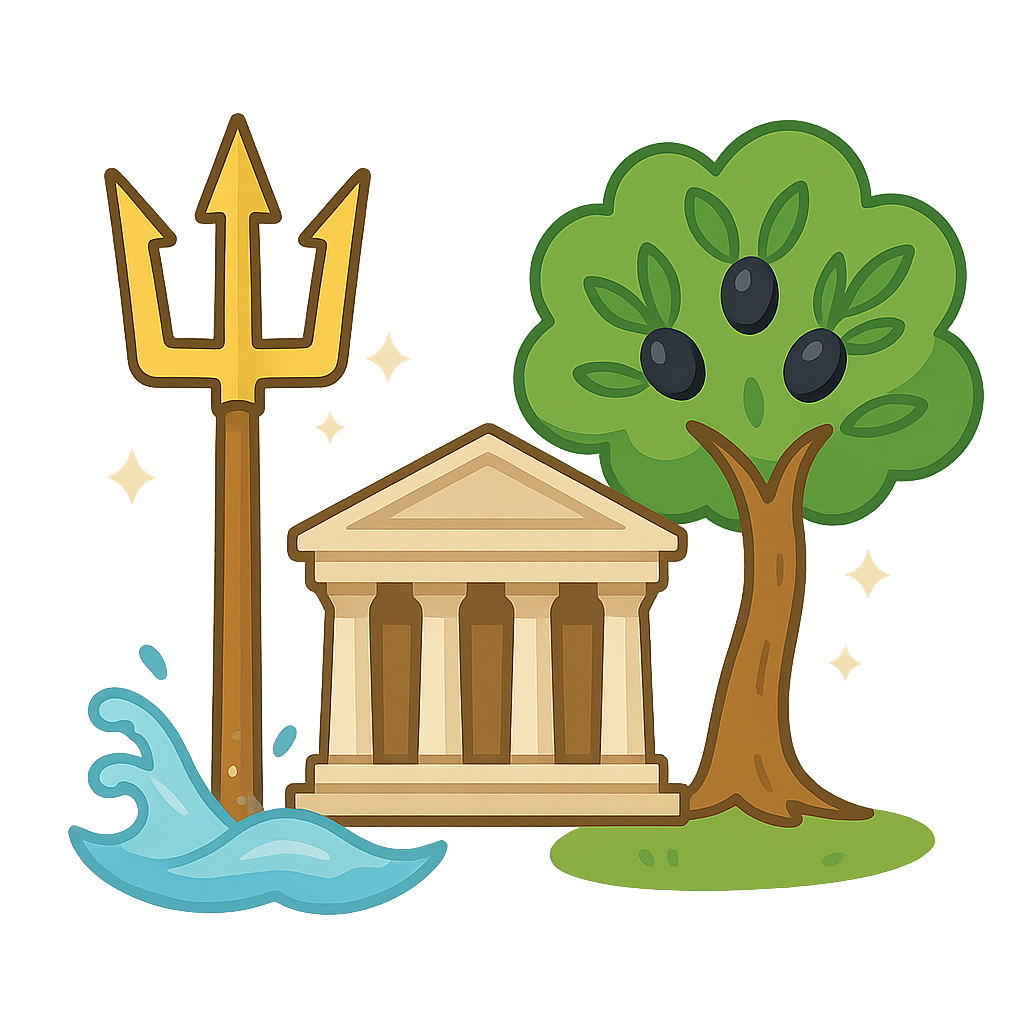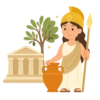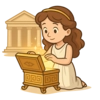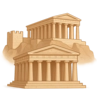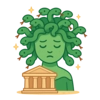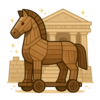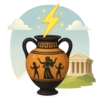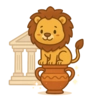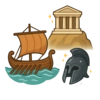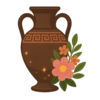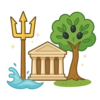The Founding of Athens
I stood upon a sun-bleached rock, the wind from the Aegean Sea whipping strands of my hair across my face. Below me lay a land of silver-green leaves and warm, dusty earth, a place of raw potential that was not yet a city. I am Athena, daughter of Zeus, and I saw in this place a future beacon of wisdom, a cradle for democracy, and a center where art and justice would flourish. However, I was not alone in my ambition. My powerful and tempestuous uncle, Poseidon, Lord of the Tumultuous Seas, had other ideas. He saw this land as a future naval powerhouse, a fortress ruled by the might of the waves and the glory of conquest. The tension between us was as thick as a storm cloud, a silent clash of water and earth, of force and foresight. To settle our dispute, the other gods of Olympus, led by my father Zeus, decreed a contest. This was the famous myth of the Founding of Athens. The rules were simple: whoever could bestow upon the mortal inhabitants the more useful, more profound gift would win its patronage and have the city named in their honor. The stage was set, not for a battle of clashing spears, but for a competition of creation, a duel of divine generosity that would shape the destiny of a civilization.
My uncle, Poseidon, ever the showman, stepped forward first to present his gift. He thrived on grand gestures, and this was no exception. He raised his mighty trident, a three-pronged spear that could command the oceans and shake the very foundations of the world. With a triumphant roar that echoed the crashing of waves against cliffs, he struck the stone of the Acropolis. A deafening crack split the air, and the ground trembled beneath our feet. From the fractured rock, a geyser of water erupted, shimmering magnificently under the Aegean sun. The people gathered there gasped in awe at this display of raw power. Here was a promise of naval dominance and unending water. Poseidon beamed, certain of his victory. However, when the city’s first king, the wise Cecrops, who was half-man and half-serpent, dipped a cup into the spring and brought it to his lips, his face soured. “It is salt,” he declared, his voice heavy with disappointment. “As briny as the sea itself.” A murmur of discontent spread through the crowd. The gift was spectacular, but ultimately impractical. It was a symbol of power, but it could not quench their thirst or water their crops. It was the sea, brought to the land, but it did not bring life. Then, it was my turn. I felt no need for such earth-shattering drama. I approached the spot Poseidon had struck, my movements calm and deliberate. I knelt, my hands touching the warm soil, and from my robes, I produced a small, unassuming seed which I planted gently in the earth. Before their astonished eyes, it did not just sprout; it grew. A slender trunk spiraled upward, branching out and unfurling leaves of shimmering silver-green. Within moments, a mature olive tree stood where there was once barren rock, its gnarled branches heavy with dark, ripe fruit. “This is my gift,” I announced, my voice clear and steady. “Its fruit will feed you. From its olives, you will press oil to light your lamps, to cook your food, and to soothe your skin. Its wood will build your homes and warm your hearths. And its leaves,” I added, plucking a small branch, “will be a symbol of peace.” The judges looked from the glittering but useless spring to the life-giving tree, and a quiet deliberation began.
The verdict, when it came from King Cecrops and the assembled gods, was unanimous. My gift, the olive tree, was chosen as the more valuable contribution to a budding civilization. And so, the city was named 'Athens' in my honor, a name that would echo through history. Poseidon's face darkened like a gathering storm. He was furious at his loss, and for a time, his resentment was felt in the turbulent seas that battered the city's shores. Yet, his power was not banished. The salt of his spring remained, a constant reminder of the sea's might, and in time, Athens would build a great naval empire, mastering the very waves my uncle commanded. His presence was still felt, but my patronage defined the city’s soul. Under my watch, Athens became the home of philosophers and playwrights, of sculptors and statesmen. It was a city built not on brute strength, but on the foundations of wisdom, democracy, and the arts. Our contest was never truly about a spring of water versus a tree. It was a choice between two ways of life: one founded on spectacular force, the other on quiet cultivation. To this day, the olive branch remains a universal symbol of peace, a timeless reminder from our story. It teaches that the greatest gifts are not always the loudest or most dramatic, but those that nourish a community, foster creativity, and provide for a lasting, peaceful future.
Activities
Take a Quiz
Test what you learned with a fun quiz!
Get creative with colors!
Print a coloring book page of this topic.

